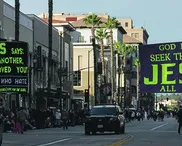Various trends within evangelicalism, and the surrounding culture, seem to be combining to present, if not the perfect storm, at least a tipping point where things could either move forward in exciting new ways or backwards alarmingly.
David Olson, the director of the American Church Research Project, has come out with a new book called The American Church in Crisis. In this book he catalogues the gradual decline in church attendance in America, and predicts that by 2050 there will be around 10% of the population in church. You can find an interview of Olson at http://www2.journalnow.com/content/2009/feb/28/study-finds-attendance-at-churches-still-falling/living/ In a slightly different take on the same issue, the Southern Baptist pastor Bob Pearle has written The Vanishing Church. He writes that the biblical church in America is being replaced with ‘Wal-Mart’ churches which are geared towards providing what their consumers want. There’s a discussion of this book at http://www.star-telegram.com/religion/story/1230235.html
A moment of decision
Those two books (The American Church in Crisis and The Vanishing Church) are just a snapshot of a much wider discussion and challenge. But, taken together with the even more compelling, and at least equally challenging, state of the American economy, we seem to be at a moment of decision for much of the American church. How will it respond to the economic crisis? Will the prosperity gospel bury its head in the sand as the prosperity in its gospel diminishes? Will feel-good and gospel-lite messages cut it in a time of uncertainty? In previous economic crises the church has had both opportunity and threat. The 1929 Great Depression seemed to decimate much of the church, but the church that it decimated was the liberal church, and the burgeoning evangelical movement grew and spread from those days. The economic crisis of 1856, which led to 30,000 businessmen on the streets in New York, was responded to with a call to prayer by one New York businessman, which prayer meetings historians believe sparked massive revival throughout America and was influential on the ministry of one former Chicago businessman, D.L. Moody.







